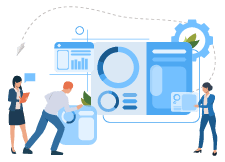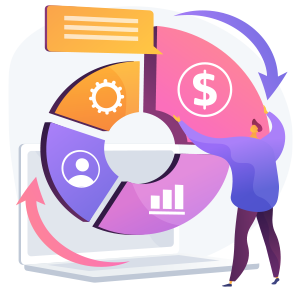Unlock Digital Value Modernizing B2B Integration
Written by Teeyah Seetharam
Consultant - Digital Marketing
Business to Business (B2B) integrations are increasingly in demand - the need of the hour - as it facilities seamless, reliable communication with other critical parts of your organization including, retailers, manufacturers, shippers and carriers.
To automate the data flow between systems and applications may seem difficult, and it is quite challenging, but you can confidently navigate through the complex IT system integration by adopting specialized B2Bi software or even better working with an experienced company.
An established B2B integration service provider will understand and direct B2B integration, ensuring to improve your revenue-driving business processes using these solutions.

B2Bi Benefits That Make You More Competitive
Over 50% of information exchanged between business partners still travels by fax, email, or phone rather than B2Bi technologies. Why?
Adopting digital processes can seem daunting but it is the only way forward. Connecting your disconnected infrastructure, gaining better data control and automating data flow between systems and applications will undoubtedly improve your business collaboration, transparency, and performance.
Considering the acceleration of digital adoption due to COVID-19, now will be the right time to consider a B2B integration. It would be the right choice for your organization because:
- You can digitally transform how you exchange files and messages with your trading partners
- Automation of data flow will reduce manual, costly errors and improve productivity
- B2Bi will not only streamline communication but enable a smooth exchange of business-critical information and help save massive amounts of time
By making lots of 'small incremental gains', you can potentially make significant improvements to your supply chain outcomes, lowering overall cost and administrative burden for both your employees and your trading partners.
Billentis has shown that organizations save up to $12.23 per electronic invoice. If you exchange one million invoices a year, trading just 1% more electronically saves you $122,300 per year. A fitting B2Bi solution will enable you to gain far more than 1% improvements across several areas of your business.
B2Bi offers end-to-end process automation including, Business Process Management, supply chain visibility, and comprehensive data control during data exchanges.
What is B2B Integration?
B2Bi is the established digital connection to manage information flows between several business participants. It integrates critical applications spread across a network or organizational ecosystem, including:
- Customers
- Partners
- Suppliers
- Service Vendors

Your company can have any mix of Infrastructure, Platform, Software, Cloud or Data Type. B2Bi will connect your disparate systems and technologies, while adhering to security and governance requirements - ultimately improving external logistic workflows throughout your supply chain and the value chain.
What are the Types of B2Bi?
People-Level Integration: People-level integration ensures easy communication between trading partners. Having seamless communication among people in different processes from different companies makes it easier to onboard trading partners, resolve disputes and handle various customer support scenarios. To ensure seamless communication, on one hand, trading partners will need to have the ability to manage their profiles, and on the other, companies will need to have traceability and audit control features to manage the user communities.
Data-Level Integration: Data-level integration is the process of enabling secure data exchange between and among systems and applications. It includes everything from order-to-cash to procure-to-pay. Integrating at this level provides flexibility to bridge communication gaps between different environments and transform documents into a readable format by technical and non-technical teams.
How to Choose the Right Integration for Your Business?
Before you select a solution/solution provider, here are a few questions to ask:
Integration: will it support open standards and interoperability with other systems?
Functionality: will it connect existing and new systems into a common framework?
Scalability: will it evolve with your company and the industry and accommodate customer and trading partner systems as well?
Flexibility: can it support third-party software vendors?
Also, don’t forget to consider the key features before investing in any B2Bi
A B2Bi solution should not only be able to connect a company to its buyers, sellers or marketplaces, it should also be able to:
- Fully automate real-time exchange of data between disparate applications
- Integrate customer relationship management, procurement, supply chain management, databases and other legacy applications, regardless of existing technology at either end
- Easily populate the existing enterprise information systems with the data resulting from B2B business process communications like purchase order, request for quotation and order status at both ends
- Provide easy integration for dynamic content like catalogs and inventory from the enterprise's systems into each portal's proprietary system




